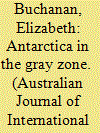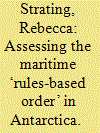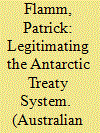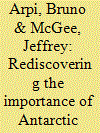|
|
|
Sort Order |
|
|
|
Items / Page
|
|
|
|
|
|
|
| Srl | Item |
| 1 |
ID:
185842


|
|
|
|
|
| Summary/Abstract |
For six decades the Antarctic Treaty System (ATS) has succeeded in keeping the Antarctic continent free from military conflict while facilitating international scientific cooperation and environmental protection. As the international system undergoes profound changes once again today with the rise of Asia, a global resurgence of great power politics, an international pandemic, and an accelerating global climate crisis, it seems warranted to explore how this successful multilateral regime might be impacted. In the face of such systemic international challenges, what explains the continued success of the ATS? What does a future multipolar world order or a crisis of liberal democratic global order mean for this carefully balanced governance arrangement of one of the most fragile environmental systems on the planet?
|
|
|
|
|
|
|
|
|
|
|
|
|
|
|
|
| 2 |
ID:
185848


|
|
|
|
|
| Summary/Abstract |
All appears quiet on Australia’s southern front – Antarctica. The continent remains a beacon of cooperation, home to a continued system of international governance and scientific engagement, lauded as a political win from the depths of the Cold War. Beneath the surface, however, this article argues that strategic competition is now building. In Antarctica, this competition takes the form of gray zone activities. This article argues that the proliferation of gray zone challenges could jeopardize the future of the Antarctic Treaty System (ATS). This article analyses gray zone activity in Antarctica and highlights the growing complexity Australia faces, as Canberra pursues the dual objectives of protecting Australia’s territorial claim to the Australian Antarctic Territory (AAT) and bolstering the ATS.
|
|
|
|
|
|
|
|
|
|
|
|
|
|
|
|
| 3 |
ID:
185846


|
|
|
|
|
| Summary/Abstract |
International Relations has become increasingly interested in maritime order as the oceans have emerged as a key site of strategic competition. The South China Sea has become totemic of contests between ‘free’ and ‘closed’ visions of the seas, and is viewed by some as a litmus test for China’s efforts to re-write the ‘rules-based order’ in other maritime domains. This article examines the maritime ‘rules-based order’ in Antarctica, critically examining how and why the United Nations Convention on the Law of the Sea (UNCLOS) matters for the Antarctic region, the Southern Ocean and mechanisms of regional governance. This article contributes to understanding the complexity of maritime order in Antarctica by using Australia’s maritime claims as a case study. Australia is the largest claimant state in Antarctica, with the Australian Antarctic Territory (AAT) constituting 42% of the landmass. This paper examines Australia’s contentious maritime jurisdiction and its ‘normative hedging’ strategy that simultaneously asserts maritime claims and defends collective governance mechanisms, despite the apparent dissonance between these two positions. It argues that the Antarctic region has its own unique ‘rules-based order’ and geographic realities that complicate cross-regional comparisons, and that even so-called ‘like-minded’ states interpret maritime rules in different ways.
|
|
|
|
|
|
|
|
|
|
|
|
|
|
|
|
| 4 |
ID:
185849


|
|
|
|
|
| Summary/Abstract |
China took its first tentative steps into the Antarctic around 1980, travelling South with other nations’ Antarctic programs. Australia hosted the first Chinese scientists to travel to East Antarctica to conduct research in the early 1980s. China signed the Antarctic Treaty in 1983 and became a Treaty Consultative Party in 1985. Since its first small forays, China’s Antarctic activities have grown considerably: it now has two permanently occupied Antarctic stations, other Antarctic facilities and is currently building a station on in the Ross Sea region. China’s Antarctic science program is broad; it has economic activities in the region include fisheries and tourism, and has expressed longer-term interest in resource extraction. In recent years, China has become an assertive participant in Antarctic governance. This paper analyses the geopolitical origins of the Antarctic Treaty, China’s growing Antarctic presence, and the implications this has for the region, including the policies and strategies of Australia and key Indo-Pacific partner states in the Antarctic.
|
|
|
|
|
|
|
|
|
|
|
|
|
|
|
|
| 5 |
ID:
185847


|
|
|
|
|
| Summary/Abstract |
The Antarctic Treaty System provides the corpus of law that governs the obligations of its Parties to protect and conserve the Antarctic environment. The System consists principally of the Antarctic Treaty (the Treaty), the Convention on the Conservation of Antarctic Marine Living Resources (CAMLR Convention), and the Protocol on Environmental Protection to the Antarctic Treaty (Environmental Protocol). The Antarctic Treaty establishes the Antarctic Treaty Consultative Meeting – the body that makes decisions under the provisions of the Treaty and Environmental Protocol. The CAMLR Convention establishes the Commission for the Conservation of Antarctic Marine Living Resources (CCAMLR) – its decision-making body. Together, these two international bodies are responsible for the modern-day conservation and environmental management regimes for Antarctica and the Southern Ocean. This paper looks at the scope of law developed under the Antarctic Treaty System and its evolution; and at the interaction between the different components of the Antarctic Treaty System. The paper also forecasts some of the future challenges to conservation and environmental protection in Antarctica and the Southern Ocean.
|
|
|
|
|
|
|
|
|
|
|
|
|
|
|
|
| 6 |
ID:
185845


|
|
|
|
|
| Summary/Abstract |
Like other international institutions, the Antarctic Treaty System (ATS) relies on the goodwill and self-binding commitment of its members. Legitimacy, understood as the belief in the ‘rightfulness’ of a governing arrangement by its stakeholders, lies at the heart of the ATS’ success as a multilateral institution. Global warming and geopolitical power shifts are poised to challenge established forms of Antarctic legitimacy and effectiveness, with external calls for Antarctic democratisation and reform increasing. Using the concepts of input, output, and throughput legitimacy, this paper explores how the ATS has been legitimated as the only authoritative decision-making context for Antarctic matters, internally amongst Treaty Partners as well as externally towards the rest of the international community. It argues that the increase of input legitimacy through the inclusion of more consultative parties led to a perceived lack of output legitimacy for some especially environmental critics which illustrates the importance but also the limits of maintaining consensus about throughput legitimacy: the agreed upon processes and rules of decision-making. Finally, the analysis problematises the inhibiting centrality of nation states and the logic of sovereignty during times of global ecological and geopolitical change and asks how an ambitiously democratic future of Antarctic governance in the Anthropocene might look like.
|
|
|
|
|
|
|
|
|
|
|
|
|
|
|
|
| 7 |
ID:
185843


|
|
|
|
|
| Summary/Abstract |
International law provides a system of legal order for the conduct of international relations. Within this system, states may constitute regional legal regimes in a continuous geographical area to address their own regional problems. In Antarctica, states active in the region have developed a sui generis regional legal regime (conceptualised here as ‘Antarctic Law’) to address problems of the Antarctic. During most of the twentieth century, Antarctic Law played a central role in understanding human interaction within, and international ordering of, the Antarctic region. However, over the last two decades, understanding the importance of the legal and regional nature of Antarctic law has become less prominent. Instead, Antarctic scholarship (including legal analysis) has moved towards a universalist perspective, interdisciplinary scholarship and critical approaches. We argue these approaches have under-appreciated the importance of the legal ordering of the region. New challenges within the region will require responses that draw on this regional legal ordering. This paper therefore aims to be a first step towards rediscovering the importance of the concept of ‘Antarctic Law’ as a regional and legal regime with a key role in providing successful international order within the Antarctic region to meet the challenges of the early twenty-first century.
|
|
|
|
|
|
|
|
|
|
|
|
|
|
|
|
|
|
|
|
|